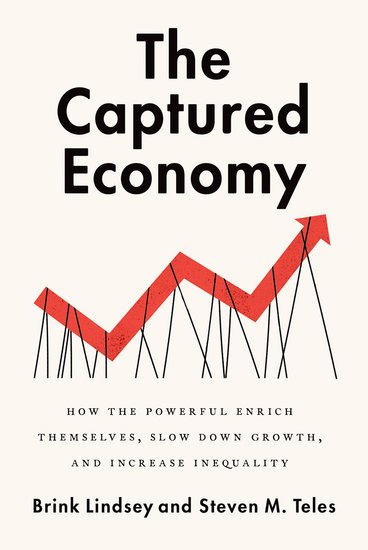The rents are too damn high. That’s the conclusion of Brink Lindsey (of the center-right Niskanen Center) and Steven M. Teles (of Johns Hopkins University and Niskanen) in their book The Captured Economy: How the Powerful Enrich Themselves, Slow Down Growth, and Increase Inequality. By “rents,” Lindsey and Teles don’t mean what you’re late in paying your landlord, but rather “rent” as economists understand it: profits in excess of what a free market would normally allow. In recent years, they argue, large corporations and wealthy individuals have taken larger and larger slices of the economic pie not by creating things of value—inventing the next iPhone-like innovation, say—but by using government policies to quash competition. This involves not just “regulatory capture” (a social-science term for when the industry fox watches the consumer henhouse) but a broader takeover, with all levels of the government—both those who write the rules, and those who enforce them—bending the knee to particular business interests or organized elites.
Lindsey and Teles put forward a thought-provoking and persuasive argument, one that challenges some of the pieties of America’s two major political sects. The conservative belief that the market, when left to its own devices, will work things out for the good of all can be naïve, they say, about how easily the biggest players on the economic field find ways to rig the rules or work the ref. And the view on the left that income inequality is skyrocketing because government is not doing enough is true enough, but it is also the case that government is doing too much—or, more specifically, too much on behalf of certain wealthy interests. When these privileged groups tilt the playing field to win outsized gains in the markets, the outcome is less economic growth and greater inequality—which should trouble both conservatives who champion free markets and liberals who favor government intervention, Lindsey and Teles argue.
The book examines rent-seeking (“business activity that seeks to increase profits without creating anything of value”) in several domains. In the financial sector, for example, the banker and investor class has set up a cozy nook of legal protections and government subsidies, enabling them to pursue highly profitable but systematically risky ventures (such as their aggressive hawking of the complex mortgage products whose explosive chain-reaction of failures lit up the world economy in 2008). Their market misadventures, in turn, are routinely bailed out by politicians desperate to avoid being blamed for the collateral damage wreaked on ordinary Americans. Meanwhile, the incomes of these financial mavens inexplicably get taxed at lower rates, so much so that Warren Buffet and Mitt Romney pay less in tax than doctors or lawyers in their same tax bracket (or, for that matter, their own administrative assistants).
Lindsey and Teles (who describe themselves as a libertarian and a liberal, respectively) also criticize forms of rent-seeking that happen to have fans across the left/right divide. For example, they discuss how overly stringent copyright and patent laws—the outcome of years of well-funded lobbying—have stymied innovation and creativity while benefiting a bipartisan group of business interests that includes Hollywood studios, tech companies, and pharmaceutical firms. (Big Pharma’s rent-seeking recently made the news thanks to an investigation by the Center for Public Integrity and National Public Radio, which found that “drug companies have infiltrated nearly every part of the process that determines how their drugs will be covered by taxpayers.”) In a similar way, state licensing laws regulating a wide range of occupations—from doctors and lawyers, to sign-language interpreters and interior designers—have clamped down on competition by discouraging newcomers from entering these fields, keeping wages up for industry insiders while effectively raising prices for consumers. And zoning laws have helped homeowners of all political stripes prop up the value of their property while making it harder for others to find affordable housing, particularly in booming areas with good jobs.
As smart as its analysis often is, The Captured Economy ultimately underscores a major blindspot in much think-tank thinking on matters of income inequality. To fight rent-seeking, Lindsey and Teles recommend a range of good-government reforms, from bulking up in-house expertise in federal agencies to moving decision-making out of venues where the deciders can easily be swayed by outsiders. But the authors lack a compelling vision for how these sorts of technocratic reforms will be enacted. At one point, they suggest anti-rent-seeking campaigns could follow the lead of the environmentalist and school reform movements, which each drew decisive support from wealthy donor-activists. “In the present context, the ironic implication is that efforts to claw back upward-redistributing rents depend significantly on the willingness of wealthy individuals and foundations to provide funding and organization,” they write.
But there is an alternative source of funding and organization that Lindsey and Teles don’t much discuss: labor unions. Before its decline in recent decades, the labor movement helped keep America’s economic system in some sort of balance, providing a countervailing power to check the influence of big business. As scholars have found, a thriving union sector helped not just workers they directly organized, but also those in workplaces that had to compete for workers. And when policies like higher minimum wages and expanded health care coverage were enacted, labor unions often provided the economic, political, and informational muscle to win those struggles.
But by the definition Lindsey and Teles use, unions are rent-seekers—able to “increase the wages and job security of their members above what a competitive market would provide, with costs passed on to consumers,” as the authors put it. In fact, the goal of school reformers has often been to smash teacher unions, which they label special interests that rack up unfairly high salaries and employment protections at the expense of kids. Based on the book’s anti-rent-seeking analysis, one could draw the conclusion that we should rein in all unions with the very same aggressiveness used to rein in, say, Wall Street bankers.
But the problem is not really that there is too much rent-seeking. As I argue in my book, the problem nowadays is that there isn’t enough on behalf of the working class. Indeed, with the decline of organized labor, ordinary American workers are the one “special interest” that routinely gets ignored in Washington and the nation’s statehouses today.
Here it is important to recognize an important fact about the economy: the rents are always going to be too damn high. Many social scientists, particularly economists, like to imagine a state of nature where markets are truly free, competition leads to greater efficiency and innovation, and government has nothing to do but enforce a few rules—mainly about who owns what. But others, particularly sociologists, would point out that the government is always heavily involved in the economy. Markets are not some Platonic ideal or divine design, handed down from up high. Governments construct them, at every step along the way making political choices about what rules will exist, and how they will be enforced. Those choices are judgment calls that inevitably give some players an advantage over others.
Attaining a nirvana of perfectly free markets, where individual buyers and sellers frolic together, is not only impossible, but also ignores the fact that certain market players always wield more power than others, and there are always losers as well as winners. Whether we call it rent-seeking or not, collective organizing on behalf of policy advantages is not inherently bad, and in fact, given the inherently unequal nature of political and economic life, it is essential if disadvantaged groups are to get a “fair” deal. (Think of the political party machines of past centuries, which, as scandal-ridden as they were, gave impoverished new European immigrants well-paid patronage jobs and a powerful voice in the country’s politics.)
The distinction I’m making is not a trivial one. If it is true that rent-seeking is not a bug, but a feature, of our economy—that every group bands together on behalf of their interests—that changes how we should deal with it. Rather than seeking to root it out everywhere, we’re better off understanding economic policy—and politics more broadly—as a way of prioritizing interests. As Lindsey and Teles themselves point out, the wealthy have an easier time at rent-seeking—not just because they have more money, but also because they often hail from the same cultural and intellectual worlds as the politicians and regulators they seek to win over. Other kinds of rent-seekers—such as taxi drivers of “modest incomes,” or labor union members who are, “at best, middle class”—are, by default, at a disadvantage in this contest. Because they are playing at a handicap, we should not only tolerate some degree of rent-seeking on behalf of the working class, but actively encourage it.
This is not to say that unions don’t have their flaws. Corruption can be a major problem (again, think of political party machines). And at times unions are too willing to prioritize narrow gains for their current members over contracts and policies that will help workers more broadly. But that is the point: politics is a messy, ugly business, a continual clash between organized interests, and we should not be so naïve to think that a movement of genteel reform—particularly one “funded and organized” by “wealthy individuals and foundations”—will bring about an economy free of this sort of collective self-advancement. It is better, and more realistic, to give the working class a decent shot at prevailing in the fight.
Victor Tan Chen Victor Tan Chen is In The Fray's editor in chief and the author of Cut Loose: Jobless and Hopeless in an Unfair Economy. Site: victortanchen.com | Facebook | Twitter: @victortanchen
- Follow us on Twitter: @inthefray
- Comment on stories or like us on Facebook
- Subscribe to our free email newsletter
- Send us your writing, photography, or artwork
- Republish our Creative Commons-licensed content


 The Captured Economy: How the Powerful Enrich Themselves, Slow Down Growth, and Increase Inequality
The Captured Economy: How the Powerful Enrich Themselves, Slow Down Growth, and Increase Inequality